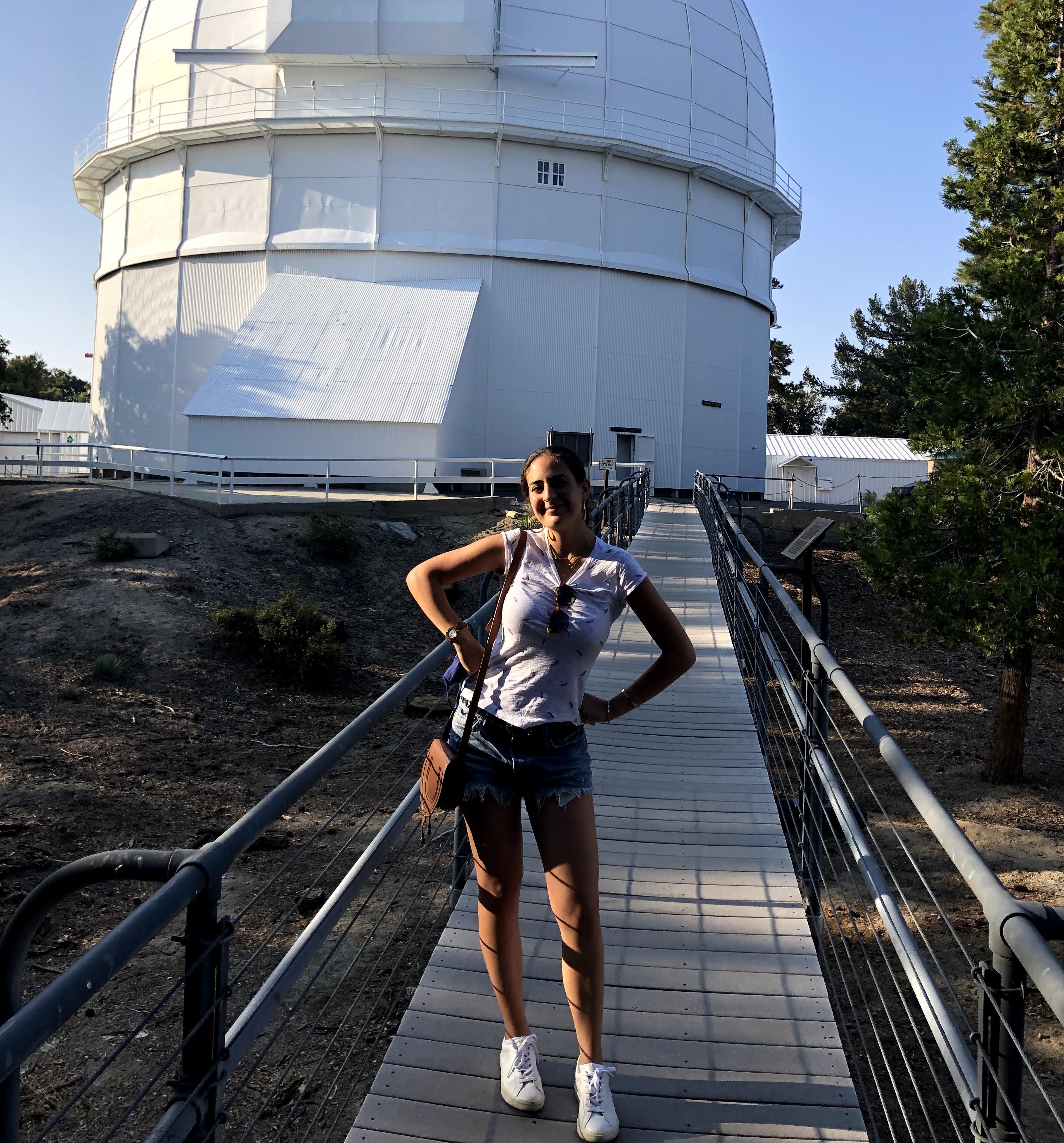About Me

I am a Ph.D. candidate in the Astronomy Department at Yale University working with the SAGA Survey.
I work with Professor Marla Geha on characterizing star formation in satellite galaxies around Milky Way analogs. I graduated from Columbia University in 2020 with a BA in Astrophysics and Departmental Honors in Physics. As an undergraduate, I was a member of the LIGO Collaboration and I worked with Professor Szabi Marka and Dr. Zsuzsa Marka. I contributed to the LLAMA pipeline to search for gravitational wave and high energy neutrino coincidences, and I worked on both the software and hardware of the LIGO timing diagnostic system. As part of the University of Florida International REU program, I worked with Professor Chris Van Den Broeck at Nikhef in the testing GR subgroup of the LIGO - Virgo Collaboration. I was also a participant in the Columbia Astronomy research exchange program with Pontificia Universidad Católica de Chile, where I spent a summer working on dark matter annihilation using simulated CTA data with Dr. German Gomez-Vargas.
I care deeply about mentoring, pedagogy, and public education, and I devote time to building community in a variety of ways. I serve as an elected representative on the Astronomy Student Council at Yale, and am a member of the Astronomy Climate and Diversity Committee. I am also a McDougal Graduate Teaching Fellow at the Poorvu Center for Teaching and Learning and a Graduate Affiliate at Ezra Stiles College. Outside of astronomy, I love to care for my constantly growing collection of plants. I enjoy visiting museums and learning about art history, and I love to travel. I am also a big fan of sudoku and sudoku variants, and I often (try to) solve the puzzles from the Cracking the Cryptic youtube channel.
I was interviewed by the Blue and White maganzine in early 2020. You can check it out here to read more about me!
Research
I work with the SAGA Survey, a spectroscopic galaxy redshift survey aiming to characterize satellites around 100 Milky Way (MW) analog systems. As an undergraduate, I was a member of the LIGO Collaboration. You can find summaries of my work on this page.
You can view my publications at the following links:
The Size-Mass Relation for Low-Mass Galaxies across Environments
Understanding how environment shapes the evolution of low-mass galaxies is key to linking internal and external drivers of galaxy growth. Using the Satellites Around Galactic Analogs (SAGA) Survey, I recently established new constraints on the size-mass relation for low-mass galaxies across satellite and isolated environments. I compared the structural properties of satellite galaxies around MW-analogs with two control samples: an environmentally agnostic population from the SAGA background (SAGAbg) sample and isolated galaxies from the SDSS NASA-Sloan Atlas. We find the half-light sizes of SAGA satellites are systematically larger than those of isolated galaxies, with the magnitude of the offset ranging from 0.05 to 0.12 dex (10-24%) depending on the comparison sample and completeness cuts. This offset persists among star-forming galaxies, suggesting that environment can influence the structure of low-mass galaxies even before it impacts quenching. The intrinsic scatter in the size-mass relation is lower for SAGA satellites than isolated galaxies, and the Sérsic index distributions of satellites and isolated galaxies are similar. In comparison to star-forming satellites, quenched SAGA satellites have a slightly shallower size-mass relation and rounder morphologies at low-mass, suggesting that quenching is accompanied by structural transformation and that the processes responsible differ between low- and high-mass satellites. Our results show that environmental processes can imprint measurable structural differences on satellites in Milky Way-mass halos.
Neutral Gas Depletion in Satellites
I am leading a neutral hydrogen (HI) follow-up campaign of 81 SAGA systems with the Green Bank Telescope (GBT) to quantify the neutral gas content in satellites. Our preliminary results suggest that the satellite population is gas-depleted relative to isolated galaxies, aligned with expectations from the literature that environmental processes lead to population level depletion.
Community
Increasing the accesibility and inclusivity of science is deeply important to me, and below are some of the ways I engage with both my professional and public communities.
Outreach and Mentoring
- Yale Astro Sibs Program
- Open Labs at Yale
- Reading Team Math
- Columbia BlueShift
- SCiMMA
- Columbia Astronomy Public Outreach
- Letters to a Pre-Scientist
- Skype a Scientist
Service
- Yale Astronomy Student Council
- Yale Astronomy Climate and Diversity Committee
- Yale Data Science X Astronomy & Astrophysics Seminar
Contact
You can email me at: yasmeen.asali@yale.edu
